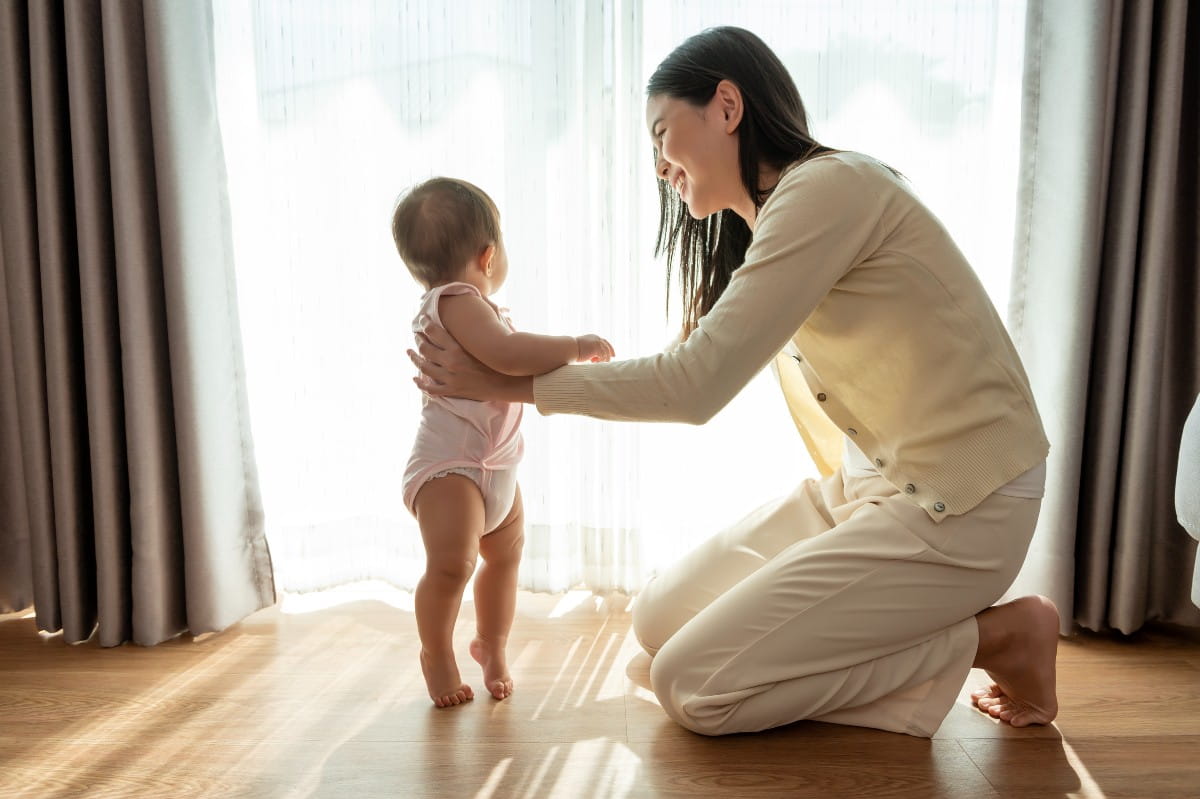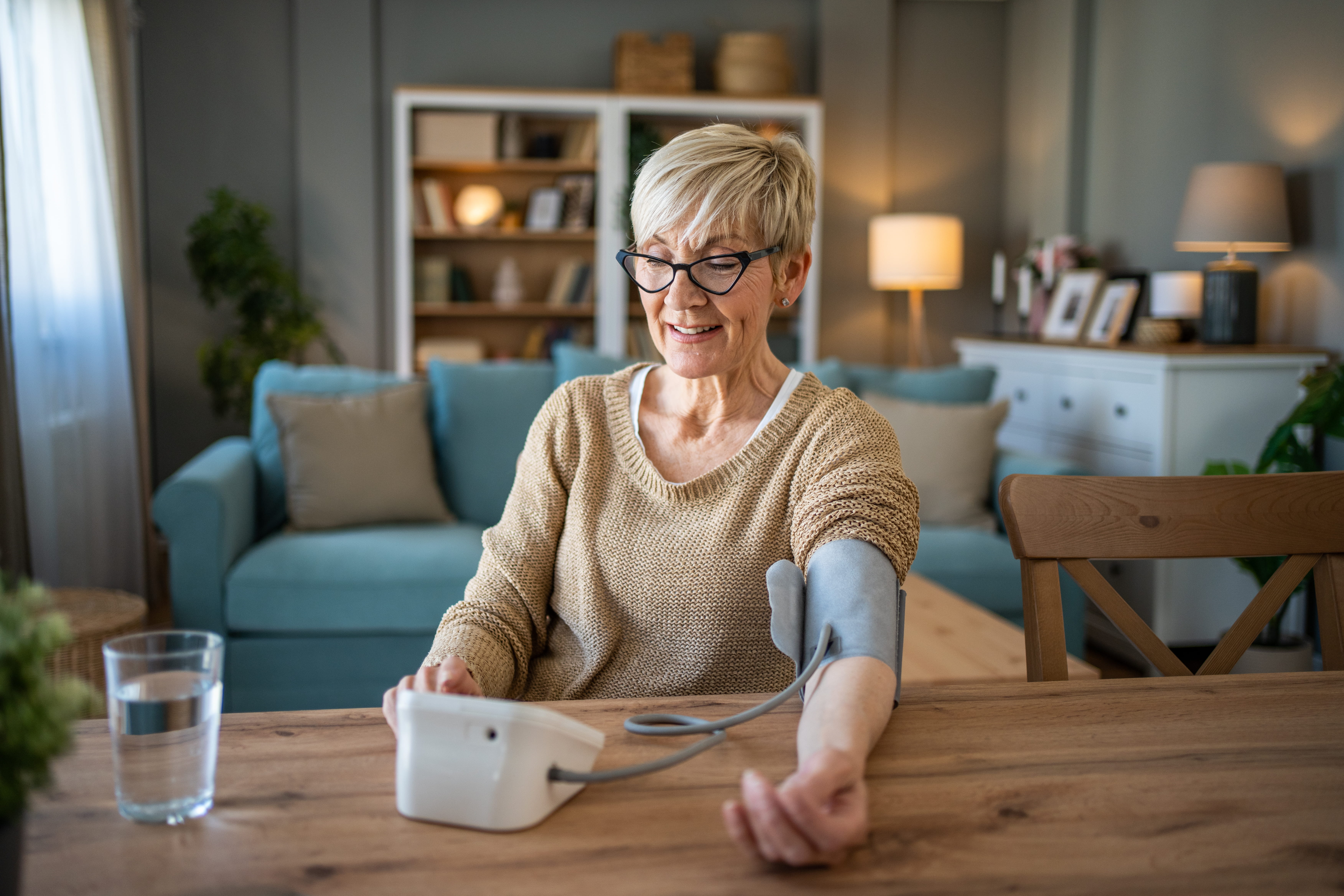Frankye Myers: From Riverside Health, this is the Healthy You Podcast, where we talk about a range of health-related topics focused on improving your physical and mental health. We chat with our providers, team members, patients, and caregivers to learn more about how to maintain a healthy lifestyle and improve overall physical and mental health.
So let's dive in to learn more about becoming a healthier you.
I'm really excited to have with me today in the Healthy You Podcast, studio Dr. Jennifer Johnson, OBGYN with Riverside OBGYN Specialists at Brentwood. Welcome.
Jennifer Johnson: Hi, thank you. I'm excited to be here.
Frankye Myers: Yes, we're glad to have you. We're going to be talking a little bit about About taking charge of your postpartum health.
I definitely remember those days. We did a mini series on pregnancy and our last episode was on the fourth trimester that highlighted what takes place for mom and baby after delivery. Today, we're going to be adding to that discussion and talk about longer term, six months to one year after delivery, how to take care and make time for yourself as a mom while caring for your newborn.
I'm interested to learn about this myself. Dr. Johnson, you are a board certified lifestyle medicine.
Jennifer Johnson: So not only do I do OB GYN, I also have a focus on wellness, especially postpartum wellness. So, lifestyle medicine has six main points that we like to talk about, which is relevant really to everyone, but especially extra struggles when you're a new mom.
So the main things are diet and exercise, which I like to say nutrition and movement because diet and exercise sounds a little too intense, but nutrition and movement. You know, controlling sleep, stress, social connections. And then the main part of that is also avoiding risky substances. So if you put all six of those things together, that can help you be your best self.
Frankye Myers: Okay. Tell me a little bit about why you went into medicine. And then the specialty as well.
Jennifer Johnson: Okay. So I've always been fascinated by pregnancy. The fact that we can create a human being and then feed that human being and everything that goes along with women's health has just always been amazing to me.
Every time I'm there for a birth, I'm just always in awe and amazement.
Frankye Myers: Right. And for you to do that additional specialty, what was the impetus for that?
Jennifer Johnson: So actually a friend of mine when I was in the military said Jen, you're always talking about wellness and nutrition and exercise and focusing on healthy things.
She said, have you ever heard of lifestyle medicine? And I said, no. And she said, you should look into it because you would be able to get the certification. You would do great. So, and just like that, everything I was, went to the conference, did the training did all the extra educational credits and found it's a way of helping my patients without focusing on the medicine, more focusing on the wellness.
Frankye Myers: Yeah, I love that. There's There's so much focus on the six weeks after pregnancy when you come back, when you come back in and you get that good bill of health, right? And then it kind of just becomes your annual checkups thereafter. So I'm really excited to hear that there's that focus from six months to a year because that's such a trying time.
I remember. Being a new mom and, and, and, and how challenging that was.
Jennifer Johnson: Right, and it's definitely not flipping a switch at six weeks. So it took nine months to go from not being pregnant to having your baby, and it takes another nine months sometimes to get back, so.
Frankye Myers: Yes, and sometimes our definition of being a good mom is taking care of everybody else and not really, you know, checking in on ourselves.
Jennifer Johnson: Right, Will find when I go into a room to see a patient in a postpartum visit, I say, how are you doing? And they say, the baby's fine. I said, how are you doing?
Yeah.
So we want to redirect and focus on mom as well.
Frankye Myers: Yeah. They're associating doing fine with how the baby's doing and not being in that Wow, that's powerful.
So sleep, what is sleep? As a mom and especially a new mom. So I'll never forget that time. Can you share just some strategies or just some, um, pearls around how to prioritize sleep for, for mom.
Jennifer Johnson: Right. So the challenging part is going to be following part of your baby's routine. So babies are going to be on different schedules all the time.
And I try to explain, you know, the reason being is that they're still developing. So as their brains are changing, their bodies are changing, their sleep So we kind of have to work with them. But once you find a routine that works for both of you, that's the main thing. So whatever that routine is, if it's a nap in the afternoon, if it's sleeping in late, if it's getting up early, whatever works for the both of you as some sort of routine.
Um, definitely asking for help. So if a neighbor is willing to watch your baby while you take a nap, that's perfectly fine. You know, so you may not be able to sleep every time your baby sleeps, but trying to sleep when the baby sleeps is ideal.
Frankye Myers: Yeah, having a village, it's okay, you know, to have help. Right.
Definitely. Sometimes we don't want to always ask for help. I know for me, I'm now empty nest, but, you know, raising kids and prioritizing family, I can go to sleep whenever I want and I still don't, I still find myself doing a bunch of routines because that's what I was accustomed to doing, like, a large part of my life.
Jennifer Johnson: Right. And then as part of lifestyle medicine, they really focus on certain, you know, things standard, so to speak, for um, good sleep. So not doing something stressful right before bed, not even really watching TV. So using your bedroom as a place to relax and whatever you find to be, that's calming. And if you have mind running, you're worried about something, just write those thoughts down and tuck them aside for the next day.
Oh, okay. That's a good idea. Yeah. So you don't have to keep overthinking it. Just, you know, make a little note to yourself and say, I'm not going to focus on that now. I'll take care of that tomorrow.
Frankye Myers: Okay, are there things that you see from a signs and symptoms perspective when women come back in that are really clues that you're not getting enough rest and, and, and.
Jennifer Johnson: Right. So we all think we joke. Yeah, for sure. So we joke about, you know, being pregnant, pregnancy, brain, postpartum brain, but, you know, tending to forget things that's very common, feeling a little bit disorganized, feeling a little bit like I can't focus. I can't kind of, you know, keep my thoughts together.
Um, and even just the sadness and anxiety that can be normal, but sometimes it's not normal. And it's something we need to intervene and help you with.
Frankye Myers: Okay. That's great. That's, that's, that's good having, having a routine around that. I know with social media, I think that that's the way at night to like wind down, which you listen to music.
Jennifer Johnson: Yeah, we recommend not a screen, not using a screen. So um, whatever you find to be calming. So if it's to listen to some music, if it's to read a book, um, I personally like to do yoga. It's only five to 10 minutes, but every night before bed I do five to 10 minutes and that's my like reset time for bed.
Frankye Myers: Okay. Okay. And so you did talk a little bit, but we'll Um, uh, you did mention, but it's called a duo, right? So is that nutrition?
Jennifer Johnson: Oh, right. So, yeah. So nutrition and movement. So that usually when people hear lifestyle medicine, they think, you know, we're only talking about nutrition and exercise, but you know, we had already talked about sleep, but tying all three of those, cause we do all those things every day.
We move every day, we eat every day, and we sleep every day. So, you know, optimizing that to make us as healthy as possible.
Frankye Myers: I know for busy women or anybody, right? Right. It's, it's easier to grab things sometimes that are prepared, um, and I've tried to even meal prep myself, like, um, so I think that planning what you're going to eat will help you be more successful as it relates to, you know, making healthy choices, which is important.
Jennifer Johnson: Right. Yeah. Most people are not looking for extra work to spend in the kitchen or grocery shopping. So whatever streamlines that process.
Frankye Myers: All right. So, um, In our last episode in that miniseries, we talked about postpartum depression, a lot of conversation around that and what signs to look for. Um, want to dive into that just a little bit more and the importance of mental health and you know, we mentioned, as I mentioned earlier, it's okay to ask for help, um, you know, because sometimes there's a negative stigma associated with, you know, any type of depression.
Um, um, so, and there is support. So, If you can mention or talk a little bit about that
Jennifer Johnson: right. So, I actually wanted to highlight one of my favorite resources. It's postpartumva. org. Okay. And if you go on that website and at the very bottom of the screen, you're going to see a couple links to click on. Um, it's going to say like extra materials or something like that.
I personally. I pretty much give this to all my patients. There's two documents you can look at. One is called the Path to Wellness and another one is called the Postpartum Plan. And it really just helps to organize your thoughts, find out, you know, am I getting enough sleep? Am I taking care of myself?
Who else could I ask for help? What else could I ask them to help me with? And so sometimes showing it to a partner or a friend in writing, it really makes it more obvious that you're not getting those needs met for yourself.
Frankye Myers: Okay. That's a really good way of looking at that, thank you for sharing that. So, if you've flown before, we've all heard of flight attendants talking about making sure you put the oxygen mask on first before you help anyone else.
And that point is so applicable here as well. As new moms, we have to make sure that we take care of ourselves, right, and make sure we have our own oxygen mask on or we won't be able to save anybody else. So, I'd never really thought about it like that. That was very powerful. Um, Can you just elaborate on that a little bit more?
Jennifer Johnson: Sure. So, you know, we don't ever want to be running on empty, but there's going to be good days and bad days. Um, but as best we can to try and take care of ourselves, um, it's not selfish. It's actually a form of self care, self love, however you want to interpret it. So if you're doing well and you're healthy, you're going to be doing a better job as a mom and family member and a friend.
Frankye Myers: Absolutely. I think another, Key point, and I'll let you elaborate, Dr. Johnson, is, um, keep up with your, your visits. Like sometimes we make sure we get everybody to their annual checkups and we don't do that for ourselves. And then if you have certain conditions, you have to stay on top of it. And I think that's so important for me.
I have a family history of diabetes and high blood pressure and I'm a healthcare professional. Um, and I didn't always do my due diligence when I was younger, but, um, Um, I have become more proactive and have been able not to have those things, um, become active diseases for me.
Jennifer Johnson: Yeah. And we want to help you.
So if you're having trouble, you know, getting to an appointment for any particular reason, reach out to us. Let us know whether it's an issue with childcare or transportation. We'll find a way to get you in and make sure you get your appointment.
Frankye Myers: Okay. All right. You are also board certified. You're a busy lady as a lactation consultant.
Um, and I did nurse my, um, second child. I didn't my first, but I did my second child and it was the most rewarding and convenient. Thing that I've ever done.
Jennifer Johnson: Right.
Frankye Myers: So initially, you know, my mind, because typically you do what your, your mom did. And so my mom didn't nurse. And so when I said I was going to do it, she was like, wow.
Uh, and I, I remember when she would come visit and she was like, cause it seems to be really easy and it was comforting for me. And then it helped me keep a really good waistline as well. So immediately after, cause you burn a lot of additional calories. So talk a little bit about being a lactation consultant.
Um, And what that means.
Jennifer Johnson: Okay. So, um, I was always interested. I, like I said, fascinated about how your body can actually create an entire human being and then you feed that human being. So it's just amazing that our bodies have this capability, but I knew learning all of the science behind OBGYN, I didn't learn as much about the lactation or breastfeeding stuff.
So getting the training for that, because most of our patients coming in postpartum, Um, we're talking about mental health or we're talking about lactation. So I knew I wanted extra training in that area. So that way I can help my patients, whether it's one day after birth, three months after birth, whatever the questions, concerns are, just getting the extra information and knowing I'm giving them, you know, useful, helpful information.
Frankye Myers: Yes. And I know because I didn't have other women in my family that had breastfed before, I had to surround myself with women that did, and that really helped me not give up initially I think those first few weeks are so important.
Jennifer Johnson: Yes. I know when you said rewarding, I would say the two things go along all along with breastfeeding is usually rewarding and challenging. So those kind of go hand in hand.
Frankye Myers: After the initial, then the reward comes. Right. Because you, but um, it's an adjustment initially for sure, but that women's support group, I don't know if those things still exist.
Jennifer Johnson: Yeah, actually we, um, now that we're kind of past COVID and all of that, we actually meet twice a month at Riverside for a breastfeeding support group. So that's actually Tuesdays, um, the second and fourth Tuesday from one to two o'clock. So it's a drop in. You don't need to make an appointment. We're just happy to see you.
Frankye Myers: Alright, so yeah, it definitely takes a village and that's another village, um, um, as it relates to support. Um, and as we wrap up today, Talk a little bit about finding that community support and how critical that is we already talked about this particular support group Are there any other things that you would like to just, identify?
Jennifer Johnson: Just anywhere that you can connect with someone who's also going through the challenges of parenthood So if it's you know saying hi to a new mom at a playground or like you said at the church, wherever you want to go, just making that connection because part of lifestyle medicine, we really emphasize social support.
And so to go through it with another person is really helpful. So talking about the long days and the long nights. And as we say, um, the days are long and the years are short when it comes to parenthood. So finding a connection with someone going through it with you can be super helpful.
Frankye Myers: Absolutely.
Absolutely. Well, Dr. Johnson, thank you so much for joining us today. You are welcome to come back anytime, um, and, uh, sharing such valuable information for our viewers. Um, and to all our listeners, thank you for listening. Uh, and if there is a topic that you are interested in learning more about. Please email us at RiversideStrong, one word, at R I V H S dot com.
Jennifer Johnson: All right. Thank you. Yes. Thank you for having me. Thanks. Thanks for coming.
Frankye Myers: Thank you for listening to this episode of Healthy You. We're so glad you were able to join us today and learn more about this topic. If you would like to explore more, go to RiversideOnline.com.



